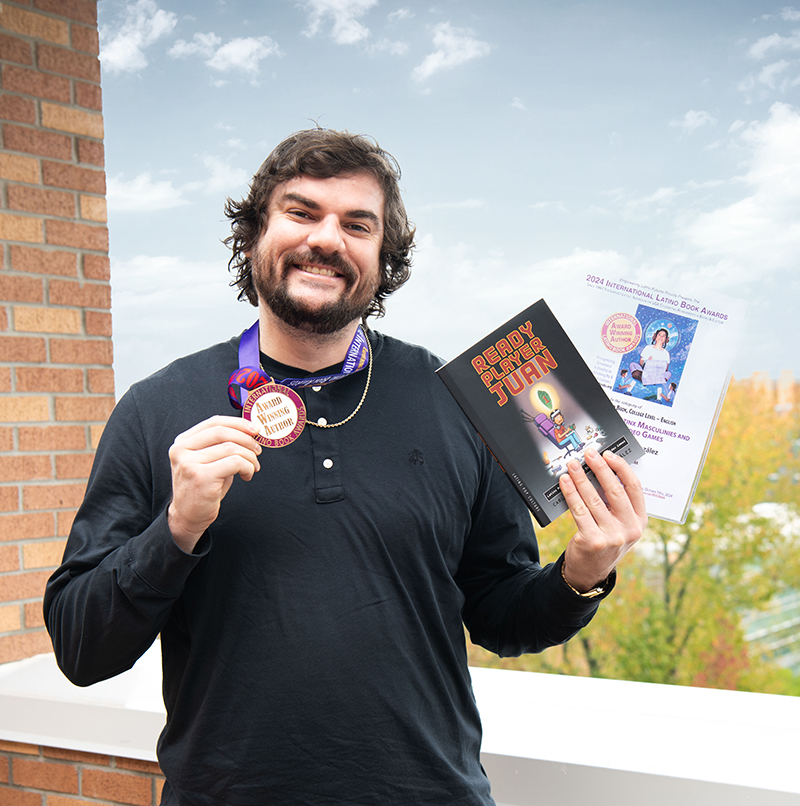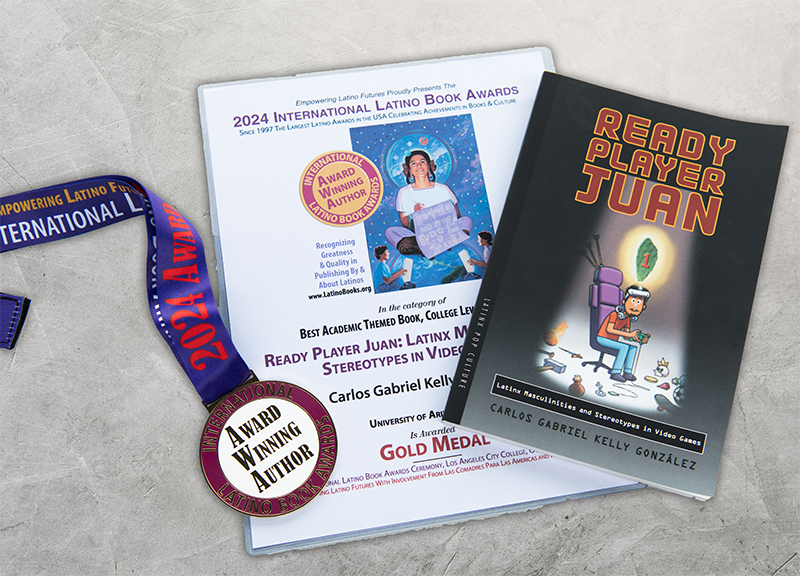Carlos Kelly, Ph.D., Assistant Professor of English Transforms Research, Life Experience, and Love for Video Games into an Award-Winning Book
KENNESAW, Ga.
(Nov 15, 2024) — 
Carlos Gabriel Kelly Gonzáles, Ph.D., (he goes by Carlos Kelly), has come a long way by his own account. As a young boy, he says, “I was never one of the smart kids growing up. In fact, I used to think when I was a kid that I was stupid.” His origin story fueled a self-doubt that is in one way not surprising, in another more exciting way it ignited the success of the gold medal award-winning book author he is today. Kelly was presented with the gold award at the 2024 International Latino Book Awards, held October 19 at Los Angeles City College, Los Angeles, CA, for his book Ready Player Juan.
Born in the U.S. and raised in Mexico for the first three years of his life, Spanish was the primary language spoken at home. His father was educated in Mexico and both his parents pushed him to pursue his education. That pursuit was initially more challenging than he expected. He says it started with the disconnect between Spanish and English. “I was starting school in the US and just not getting good grades.” As a young college student, he ended up in remedial writing, but went on to say, “when I was in college, I really became a top-notch student. But that’s from fear of failing.” He explored four majors before settling on English because of his love for poetry.
Video Game Evolution
Kelly explained when people hear your name is Carlos, they default to stereotypes and rhetoric that have been used to disparage Mexican people and Latinos, particularly in television and film. He also saw these tropes being pulled into the storytelling arcs in video games produced by the gaming industry. “Video game developers and video game players have developed a taste for these more complex storylines, including a lot of open world games where you don’t have to take a linear narrative path.” The challenge Kelly sees is although the storytelling is becoming more complex since the days of Pac Man and Space Invaders, the traditional white, male protagonist is the lead, while Latinx or Black characters are relegated to sidekicks, or worse yet, the enemy or bad guys.
Kelly’s experience as a video gamer coupled with his worldview and lived experience inspired his research on the representation of Latinx characters in video game storytelling. The resulting book is an examination of this lack of representation not only in the games themselves, but in the writers’/developers’ room where the storylines are created. According to his research, writers and developers are still hovers between 70% and 80% white males. Juxtapose this against the high percentage of Latinx gamers who buy the products. According to his research, Nielsen posits 82 percent of global consumers played or streamed video games during the pandemic during the pandemic 82% of the public streamed video games during the pandemic, and of those who play video games in the US, 19% are Latinx closely followed by Black gamers.
Why it Matters
As an assistant professor of English, Kelly teaches storytelling in film, television, and video games. He believes that storytelling from a range of perspectives is not only important, but necessary, if film, TV, and video games are going to produce products that offer an accurate, multifaceted representation of any given population, which would likely open opportunities for greater market share and a larger fan base. “All those stereotypes [from film and tv] are imported into video games, and the reason is because we don’t have Latines in the room who can challenge those stereotypes,” he added.
Accessible Research
Kelly’s book delves into these issues and others, and he is meeting those inside and outside of the gaming community where they are. He has written Ready Player Juan to be readable and accessible to anyone who might be interested in the topic, shying away from academese and research lingo. Each chapter begins with a personal anecdote from his own life, such as playing Lotería, a Mexican board game, with his family in Mexico and the U.S. This personal touch and his love of storytelling and creative writing may be one reason his book won the gold medal for Best Academic Themed Book, College Level – English.

His other purpose in this approach is to engage his students so they may be inspired to consider entering the room of game developers and writers to tip the balance of representation where storytelling decisions are made. “One of the biggest concerns I had was, I wanted to write in a way that was accessible,” says Kelly. “It makes me realize the power we have as academics to clearly convey our points and our research in a way that extends beyond academia. So, that’s something that I aim for.”
He went on to say, “This is really [a] personable writing style that invites participation from readers, invites them to think about their own experiences with video games, and then presents my points of view and other [points of view], a lot of Chicana feminism, and a lot of borderlands theory to change how we think about video game stories and who’s included in those stories.”
Before conducting his research and writing this book, Kelly didn’t imagine a professional path where he could research video games and write about them. To arrive at a place of winning a gold medal from a respected literary community is still somewhat surreal to him. He submitted the work for consideration while at Rice University, then left that position to join the faculty at Kennesaw State University. As time went on and he hadn’t heard whether his entry was successful, he thought maybe a notification had been sent to his old email address. Luckily, he still had access and found the email with the news that he’d won something, but the notice didn’t say exactly what he'd won. He learned this two weeks before the awards event was to take place.
A Meaningful Moment
How he learned his award was gold is the stuff of fairytales. On event night, with his parents in the audience, his category was announced. All five award recipients in the category lined up waiting to be called, none knowing what they’d won. First a bronze, then another, neither of which went to Kelly. Then a name was called for silver – it wasn’t his. Another name called for silver, still not Kelly’s. As he realized he had won the gold medal, he had a private internal celebration, then his name was finally called.
This was an incredibly meaningful moment for Kelly. During his acceptance remarks he recalls telling the story about, “How I used to think I was stupid, right? I mean, this is for myself, but also for the community to have this space where I could be surrounded by Latino excellence, like it was just so beautiful not only to receive the award, but to see other people, other authors, scholars, writers, illustrators…to see them.” Now, he brings the medal to his class to show his students because he is a big believer “in modeling what’s possible and they need to be able to see that they can do it.” He continues to be a bit shocked by his good fortune, something he has consistently worked hard to achieve.
Carlos Kelly, Ph.D., Assistant Professor of English is in his first year at KSU and on the tenure track. He will likely be teaching a video games course in fall 2025, bringing to it multiple cultural perspectives. Prior to joining KSU, Kelly was at Rice University as a Postdoctoral Fellow in Latinx Arts, Literatures, Cultures, or Religion Studies at the Humanities Research Center. Ready Player Juan is his third book, which was preceded by a book of poetry titled, Wounds Fragments Derelict, and Errant Mythologies a publication for which he was one of three editors.











